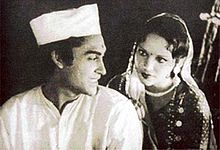Achhut Kannya
| Achhut Kannya | |
|---|---|
 Poster | |
| Directed by | Franz Osten |
| Written by | Niranjan Pal |
| Produced by | Himanshu Rai |
| Starring | Ashok Kumar Devika Rani |
| Cinematography | Josef Wirsching |
| Music by | Saraswati Devi |
Release date |
|
Running time | 136 Minutes |
| Country | British India |
| Language | Hindustani |

Achhut Kannya (English: Untouchable Maiden) is a 1936 Indian Hindi film. The film deals with the social position of Dalit girls and is considered a reformist period-piece.[1]
The film was one of several successful Bombay Talkies collaborations between Franz Osten, Niranjan Pal, Himanshu Rai, and their leading lady, Devika Rani. Music is by Saraswati Devi and lyrics by J.S. Kashyap. The film stars Ashok Kumar and Devika Rani and this was Kumar's debut film.[2]
Plot
Mohan, a Brahman by caste, sells daily essentials to villagers. He is a kind soul and helps those really in need. Dukhiya, a kacchu by caste, is a railway crossing guard. Though an untouchable, he saved Mohan's life from a snake-bite and since then Mohan and Dukhiya develops deep friendship. As such, Pratap, son of Mohan and Kasturi, daughter of Dukhiya also become friends since childhood. Growing up together, they fall in love with each other. Babulal, the village doctor, holds severe grudges against Mohan and always looking for any chance to slander his reputation in village.
Pratap being a Brahmin boy and Kasturi being an untouchable girl (achhut), social conventions of that time preclude any possibility of these two lovers uniting.
Thereafter, due to many evil twists and turns of fate and instances, Pratap ends up marrying Meera (Manorama), while Kasturi marries Mannu. Both of them are unable to forget their first love, but tries hard to make their respective marriages work. Unfortunately, the situation gets compounded by the fact that Mannu also has a first wife, Kajri, with whom he is estranged due to excessive interference from his in-laws. The hitherto smug Kajri suddenly feels threatened by the arrival of a new woman in her husband's life and arrives at Mannu's house unannounced.
Meera tries hard to win Pratap's attention towards herself and confesses her troubles to her friend, Kajri. Kajri who is also unable to gain attention of Mannu towards her blames Kasturi for their similar misfortune. Thus, she poisons Meera's mind. The two of them hatch a diabolical conspiracy to discredit Kasturi in the eyes of Mannu and villagers. They take Kasturi along to a fair mela in the neighbouring village, and then abandons her there. While searching for them in fair, Kasturi meets Pratap, who has a food stall there and both of them decides to return to their village. Meanwhile, Meera and Kajri as per their plan upon reaching their village tell Mannu that Kasturi has eloped with her lover Pratap.
Seeing Pratap and Kasturi returning together, misguided and enraged Mannu attacks Pratap, exactly when his Bullock-cart just arrives at the railroad crossing. There ensues a fisticuffs between the two, even as a train rushes towards them and the bullock-cart. Desperate to save all lives at stake, Kasturi rushes towards the train, signaling and imploring the driver to stop and in the process gets herself killed. That act of selflessness makes her a martyr in the eyes of the villagers, despite her lowly origins.
Cast
- Devika Rani as Kasturi
- Ashok Kumar as Pratap
- Manorama as Meera, don’t mixed up with Manorama
- Anwar as Mannu
- Pramila as Kajari
- Kamta Prasad as Dukhia
- Kusum Kumari as Kalyani
- P. F. Pithawala as Mohan
- Kishori Lal as Babulal
- N. M. Joshi as Inspector of Police
- Ishrat as Sukhlal
- Khosla as Patient
- Principal Dancers
- Mumtaz Ali
- Sunita Devi
References
- ^ Verma, Sukanya (27 June 2019). "When Caste surfaced in Bollywood movies". Rediff.com. Retrieved 18 May 2024.
One of the first movies to explore the consequences of caste differences, Achhut Kanya -- starring Devika Rani and Ashok Kumar -- is a star-crossed romance between a Dalit girl and Brahmin boy whose predictable disapproval can only be countered by an act of gallantry and grace.
- ^ "Achhut Kanya / The Untouchable Girl". National Film Archive of India. 2 November 2007. Archived from the original on 29 September 2008. Retrieved 18 May 2024.
External links
